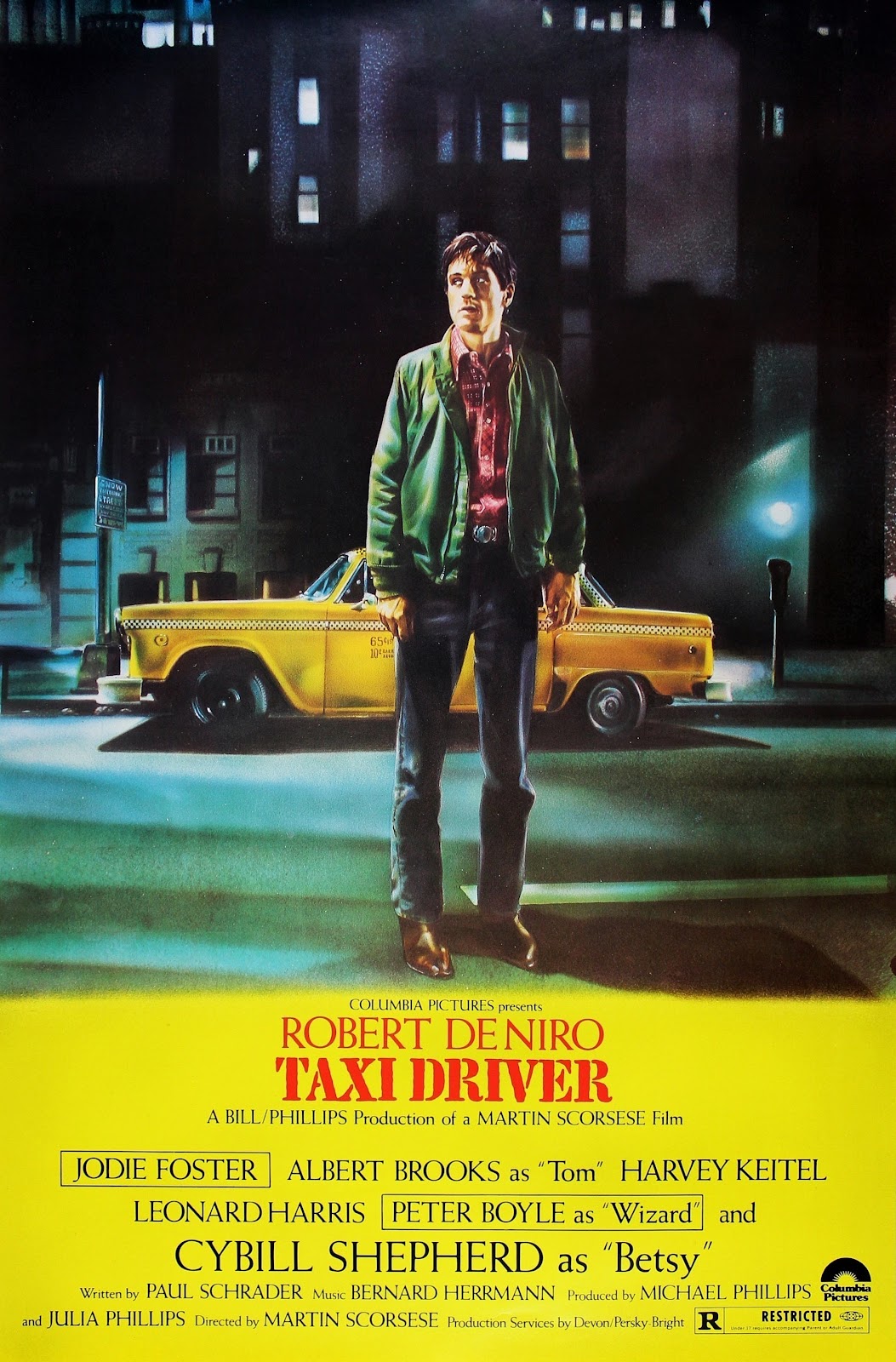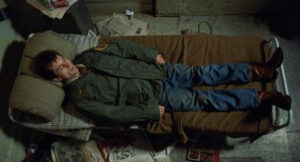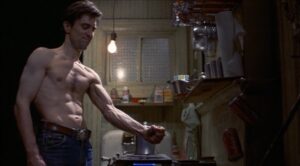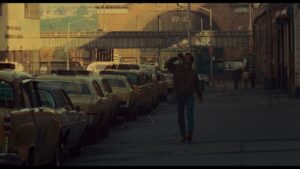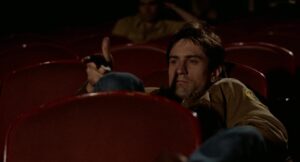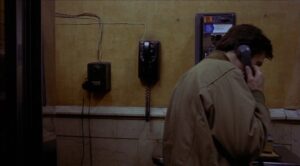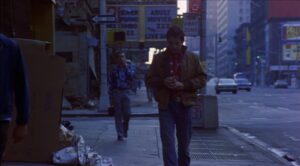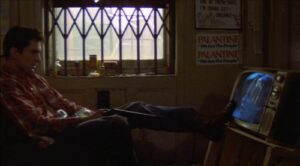Martin Scorsese’s Taxi Driver is a film that changed my life. When people talk about the magic of cinema it is almost impossible to define. I think that you know it when you see it though. That could not be more the case than with Taxi Driver. This film has tremendously guided my personal work, as I plan on writing and directing feature films for the rest of my life.
When I first saw the film, there were a number of things that I resonated with. However, more than anything, I think I resonated with the idea of a film following one character. Furthermore, the idea of a film that is manipulated by said character’s actions and mental processes. Scorsese is a god in this regard. It is easy to tell a story about somebody. It is not easy, however, to tell a story about somebody where every living fiber of the film relates back to them.
Taxi Driver is the story of Travis Bickle played by Robert De Niro, the greatest actor of all time. Travis applies for a job driving taxis because he “drives around most nights, so I figured I might as well get paid for it.” For starters, Travis is a man who is completely consumed by loneliness and purposelessness. He has failed to make anything meaningful of his life as he spends his days drinking.
Once Travis gets hired, we begin to learn more about him. Through his monologues, we find that Travis has an eloquence to the way he speaks. He has a hidden intelligence that could potentially be brought out given the right circumstances.
The first scene where I believe that we see Travis struggle with some of these issues comes in the first twenty minutes of the picture. After work, Travis decides to go to a porn-theater where we find him flirting with the girl working the counter. When she asks his order, he replies with a desire to know her name. She obviously is uninterested and even threatens to call her manager. Travis does not realize that she knows that any man attending this theater is perverted on some deeper level than most men. Yet she still works there. Even something as little as this actually touches on another one of Scorsese’s themes in this picture, as well as a number of his other early works such as Mean Streets (1973) and Raging Bull (1990). That theme would be: sometimes you have to do what you have to do in order to keep your head above water. Regardless, more than anything this is a scene where Travis’ inability to communicate with women is clearly demonstrated.
Part of the reason that Travis is unable to communicate or even utilize this intelligence is partly due to the fact that he deals with mental illness. It is never specified as to what Travis struggles with, but we are given looks inside that reveal his issues in social situations, being able to read the room, and inadequacies with women. Everything before the final sequence is essential as these amalgamations of events create the necessary stakes in regards to the suspension of belief in the picture.
The next scene, I think, shows us an inside look into Travis’ mental breakdown as well as a genius use of narration. This is the sequence in where Travis decides to turn his life around:
“Listen you fuckers, you screwheads. Here is a man who would not take it anymore. Who would not li- Listen you fuckers, you screwheads. Here is a man who would not take it anymore. A man who stood up against the scum, the cunts, the dogs, the filth, the shit. Here is someone who stood up.”
This is an extremely interesting narration for a number of reasons. The first thing that sticks out is the fact that Travis starts his monologue over halfway through, repeating himself. As he does this, Scorsese executes a re-jump cut. This is where he essentially lets a shot play out until Travis stops and starts over. That is when Scorsese cuts back to the same shot that was on screen when his monologue began.
The purpose of this scene is to demonstrate Travis’ mental breakdown and to not only demonstrate his own disorientation with the world, but also to disorient the audience at the same time. This film is a genius study of subversion on a profound level. Scorsese’s ability to put the audience in his protagonist’s, or in this case his anti-hero’s, shoes is remarkable. And this is all without even analyzing the actual dialogue. Following this little speech, we see Travis playing with his guns, which is also an extremely important moment. There is a theory in film called “Checklov’s gun.” The theory states that one should never show a gun in the first act if it does not get fired in the third act. You can use this structure for a number of plot devices, and replace the gun with whatever you want. The point is, you should never tease an audience with information that is ultimately irrelevant to the final conception of the plot.
As Travis becomes obsessed with a woman who eventually breaks his heart, he really loses it. He completely delves into the universe of isolation and soon discovers a new obsession: firearms. Travis decides to turn his life around, getting in the best physical shape of his life as well as teaching himself how to properly operate a number of firearms. This is a time when I believe masculinity plays a factor into the final themes of the picture.
He meets a young prostitute who he feels it is his duty to free from her horrible existence. In a glorious, perfect, final sequence Travis breaks into the brothel, shoots and kills the pimps making her work, and gets the police to show up.
The problem in this situation is Travis’ quest for purpose. I think that regardless of the themes that get played with, the story is about Travis finding a reason for being. The obstacles clearly are his mental issues, his economic status, and his inadequacies with women.
Personally, Taxi Driver is perhaps the most influential film I have ever seen. I remember the first time I saw it, I was literally at a loss for words. It is one of the ten most impressive pieces of art that I have ever seen. A big reason for that is the “Scorsese magic.”
I saw this film during my freshman year of college. At the time, I had zero clue that I would fall in love with cinema, but I knew I wanted to write. That day everything changed.
Scorsese subverts his audiences in all his films. He is the king of naturalistic immersion. So much so, that at times you forget you are even watching a movie. That is exactly what Taxi Driver does; we are taking every beat with Travis. Furthermore, it was the first film I saw that was about a really bad and weird person. I remember thinking, “Oh wow. You can make a movie about the worst type of person, and you don’t need to be endorsing these behaviors.”
I think there is this belief that a white male can’t possibly deal with issues because, well, they’re white males. However, going further and understanding that, “Yes, even white privileged males, can go through complex emotions,” was something that resonated with me. I don’t think this is an example of a pity project, by any stretch of the imagination, but I do think it is a realization. Scorsese creates a weak and mentally unstable character who, for some reason, we love. This was not the standard at the time. We were used to seeing James Dean types, Clint Eastwood types, big macho men. That is not Travis Bickle; even in his most courageous moments, he doesn’t have the James Dean smoothness.
Scorsese does this genius thing where he can be talking about the most immoral things on Earth, illustrating the most gruesome scenes on screen, yet simultaneously carrying a theme that juxtaposes the very content.
He uses the term “necessary violence” in regard to cinema. Scorsese grew up in Little Italy and was exposed to lots of organized crime. It is part of who he is. That being said, hearing this infused a confidence in me to write what I know. I think young screenwriters spend a lot of time writing for what they think Hollywood is going to like. This is a fatal mistake. Scripts come out contrived and inauthentic. Write what you know, mixed with the movie you want to see, and you will see magic come to life.
I believe that Taxi Driver is a film that will be relevant for as long as human beings are alive. There have been few, if any, films that come close to the way this film is able to depict the feeling of loneliness and isolation that we all go through. I also think there are so many deeper levels to this film to discuss, that the conversations will be endless.

